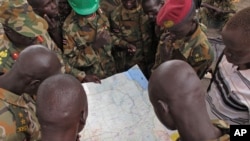ADDIS ABABA - Ten days of border security talks between Sudan and South Sudan have broken off with the feuding neighbors no closer to agreement than when they started. International arbitration seems increasingly likely after months of inconclusive negotiations.
This latest round of African Union-mediated talks ended the same way as almost every one before it, with the two sides hurling bitter words at each other. As the meetings ended Friday, South Sudan's chief negotiator, Pagan Amum, wondered aloud whether they were worth continuing.
"The talks have failed because Khartoum is not interested in peace, Khartoum is interested in aggressing us. Khartoum is interested in killing our people. Should we continue talking to them? Common sense says we should not," said Amum.
Amum told reporters his team would be back for more talks later this month. But he suggested that with the negotiations going nowhere, South Sudan's best bet might be to wait until August. That is when a United Nations Security Council resolution calls for the disputes to be turned over to an international arbitration panel.
"We have negotiated enough," Amum added. "We have agreed to demarcate the border within six months. The government of Sudan has delayed the process. With the African Union road map and the U.N. Security Council resolution 2046, we have up to August second for negotiation. After that, we have to go to binding international arbitration in all the disputed areas."
African Union mediators say the talks have been complicated by South Sudan's introduction of maps supporting their claim to territories previously considered to be north of the international border.
Khartoum's negotiators argue that a 2009 ruling by an arbitration court in The Hague places most of the key areas in Sudan, including the Heglig oil fields that are vital to the country's economy.
Sudanese Defense Minister Abdel Raheem Mohamed Hussain dismissed the South's maps as a mischievous attempt to grab land.
"This is a hostile map because the South are adding large areas not included in the U.N. map," noted Hussain . "They want to add another 10 areas [to their land] like Abyei. It doesn't give any indication they are serious or want peace, that we should be good neighbors. It shows they want to invade our country, and we think this isn't a friendly map."
African Union mediators point out that despite the hostile atmosphere, the negotiations have only broken off, not broken down. Technical level border talks will carry on until former South African president Thabo Mbeki and members of his mediation panel return for another session of high level talks later this month.
Experts say even with international arbitration, these disputes on everything from border and citizenship to sharing oil revenue are likely to drag on for years. The issues under mediation are those that proved too difficult to settle during the intense negotiations that took place before South Sudan won independence from Khartoum last year.
This latest round of African Union-mediated talks ended the same way as almost every one before it, with the two sides hurling bitter words at each other. As the meetings ended Friday, South Sudan's chief negotiator, Pagan Amum, wondered aloud whether they were worth continuing.
"The talks have failed because Khartoum is not interested in peace, Khartoum is interested in aggressing us. Khartoum is interested in killing our people. Should we continue talking to them? Common sense says we should not," said Amum.
Amum told reporters his team would be back for more talks later this month. But he suggested that with the negotiations going nowhere, South Sudan's best bet might be to wait until August. That is when a United Nations Security Council resolution calls for the disputes to be turned over to an international arbitration panel.
"We have negotiated enough," Amum added. "We have agreed to demarcate the border within six months. The government of Sudan has delayed the process. With the African Union road map and the U.N. Security Council resolution 2046, we have up to August second for negotiation. After that, we have to go to binding international arbitration in all the disputed areas."
African Union mediators say the talks have been complicated by South Sudan's introduction of maps supporting their claim to territories previously considered to be north of the international border.
Khartoum's negotiators argue that a 2009 ruling by an arbitration court in The Hague places most of the key areas in Sudan, including the Heglig oil fields that are vital to the country's economy.
Sudanese Defense Minister Abdel Raheem Mohamed Hussain dismissed the South's maps as a mischievous attempt to grab land.
"This is a hostile map because the South are adding large areas not included in the U.N. map," noted Hussain . "They want to add another 10 areas [to their land] like Abyei. It doesn't give any indication they are serious or want peace, that we should be good neighbors. It shows they want to invade our country, and we think this isn't a friendly map."
African Union mediators point out that despite the hostile atmosphere, the negotiations have only broken off, not broken down. Technical level border talks will carry on until former South African president Thabo Mbeki and members of his mediation panel return for another session of high level talks later this month.
Experts say even with international arbitration, these disputes on everything from border and citizenship to sharing oil revenue are likely to drag on for years. The issues under mediation are those that proved too difficult to settle during the intense negotiations that took place before South Sudan won independence from Khartoum last year.




